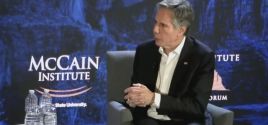Just What Is Inflation?by Douglas French, Mises Economics BlogMay. 17, 2011 |
Popular 
Dershowitz to Launch 'Massive Offensive Lawfare' Against 'Anti-Semitic' Pro-Palestine Protesters

"We Were There First and Foremost for Our Country of Israel," UNC Frat Bro Tells Fox News

Blinken Blames Social Media for Israel Losing PR War; Romney Agrees, Confirms TikTok Ban is to Help Israel

House Passes 'Antisemitism Awareness Act' to Silence Criticism of Israel as Hate Speech

South Dakota Gov. Kristi Noem Admits She Did Not Meet With Kim Jong Un As Her Book Claimed
 Justin Lahart with the Wall Street Journal wrestles with the definition of ‘inflation’ in his article “Using a Dictionary to Define Inflation Can Spell Trouble.” Lahart writes that up until 2003, Webster’s defined inflation as printing money. Since the 2003 edition, Webster’s defines inflation as “a continuing rise in the general price level.” Mainstream economists say that only those out-of-step define inflation as increased money creation. “They were quite far behind the times,” says Harvard economist Greg Mankiw. In his widely used economics textbook, he defines inflation simply as “an increase in the overall level of prices in the economy.” Lahart traces the I-word back to 1755 when “The state of being swelled with wind; flatulence,” defined inflation. In 1864, Webster’s American Dictionary of the English Language defined inflation as “undue expansion or increase, from over-issue; — said of currency.” And so on from there until 2003. “This semantic innovation is by no means harmless,” Mises wrote in Planning for Freedom. Mises points out that it’s impossible to fight an evil that you can’t name. The public gets lost when a detailed analysis is required and continually referring to this analysis is bothersome, besides being ineffective. “As you cannot name the policy increasing the quantity of the circulating medium, it goes on luxuriantly,” Mises wrote. However, what is most damaging is that when policy makers fight the consequences of inflation–a rise in prices–they make matters worse, not realizing “the causal relation between the increase in money in circulation and credit expansion on the one hand and the rise in prices on another.” Mr. Lahart writes that “there has been a shift in American thinking of the purpose of dictionaries: Rather than defining words as some experts thought they should be used, dictionaries have moved toward defining words as people actually use them.” So what we have is a generation of people (economists and otherwise) who don’t understand what inflation is. When questioned about rising gasoline prices, Fed Chair Ben Bernanke said during the Federal Reserve’s first press conference. This is a very adverse development. It accounts for almost all of the inflation. There’s not much the Federal Reserve can do about gas prices, per se, without derailing growth entirely.Just look it up in Webster’s: the Fed has nothing to do with prices. |



